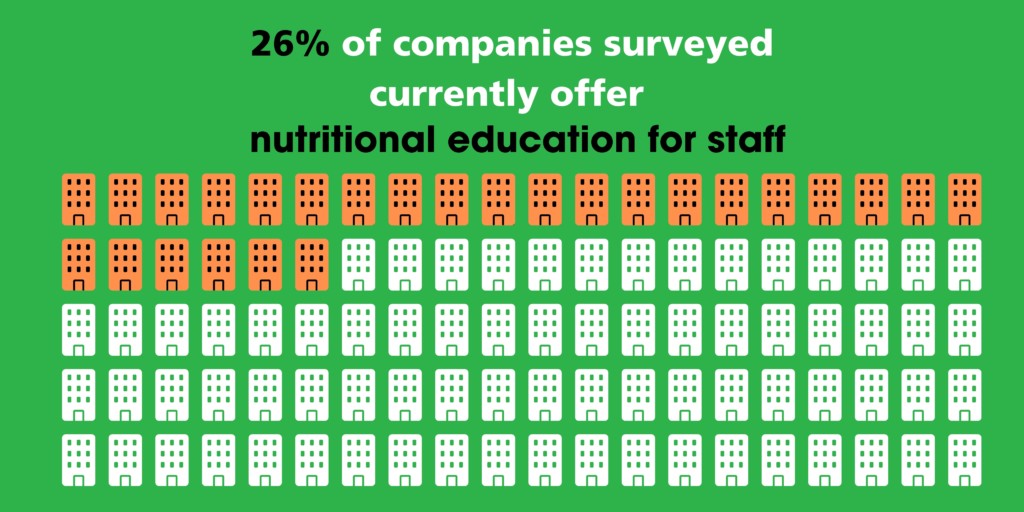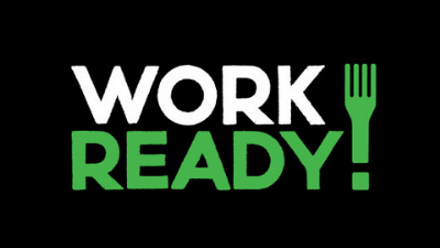
Aon (a global data and analytical professional services firm) ran a 2021 Global Wellbeing Survey asking 1,648 companies across 41 countries how they are addressing wellbeing, and the impact that a wellbeing program has on their business performance.1
Not surprisingly the top physical wellbeing risks impacting company performance were stress and burnout. But interestingly High blood pressure, Diabetes/high blood glucose, Cardiovascular disease and Obesity were amongst some of the conditions creating significant impact too, and their research suggests those with poorer mental health were likely to suffer and be impacted more by additional chronic conditions.
Nutritional wellbeing

Up to 25% of the UK’s working age population suffer from a long-term condition which can be weight related2 and employers are looking to support the productivity of their workforce through improved resilience and mental wellbeing. Employers who are seeking providers for nutrition services have limited choice and may not be able to identify a quality partner who will measure and report change effectively.
Work Ready was created as a response to the gap in existing provision and support, and the demand from the employer.
A culture of wellbeing is not an ‘initiative’, but a permanent change in how work is conducted
Just over a quarter of employees reported work environment and culture as a wellbeing concern, it’s important for companies to consider implementing regular breaks making it part of the cultural norm, when people need to recoup, refresh, rehydrate or grab a healthy snack to re-energise.
Many organizations plan to offer nutritional education and weight management, aiming to confront the epidemic proportions of obesity globally. Just since 1975, obesity has tripled worldwide with 39% of adults being overweight and 13% being obese.
AON. 2021. Working Well 2021 Global Wellbeing Survey
Companies must approach the topic of obesity sensitively, as further stigmatising weight and larger bodies in a workplace has been demonstrated to be detrimental to wellbeing and is likely to increase inequalities. BDA Work Ready welcomes any initiative which supports the use of dietitian-led clinically effective weight management services, but care should be taken when the recommendations are implemented to avoid using measures which increase this bias – a focus on ‘change of feeling’ and quality of life factors may be useful as well as weight measures.
The benefits of physical wellbeing, both in reducing health risk and positively impacting employee emotional and social wellbeing, are well documented.
AON. 2021. Working Well 2021 Global Wellbeing Survey
How can Work Ready help employers improve staff wellbeing?
As technical partners for nutrition education in the global Workforce Nutrition Alliance – and with expertise in the environmental and food service changes needed across sites to make this education really effective – Work Ready has the national network of dietitians to support businesses wanting to address these concerns as part of a wider wellbeing strategy.
The BDA Work Ready Programme is employee needs led, it measures and reports change and assesses progress to ensure a programme of continuous improvement, which can benefit both the employees and organisation.
Work Ready covers a wide range of wellbeing concerns including: focusing/working well, how food affects mood, and eating more mindfully, as well as more bespoke issues such as gut health, healthy aging, and how diet impacts women and men’s health. These can be delivered as single workshops, or alongside a long-term programme focusing on what employees want and need to support their wellbeing. To find out for information and to book see – workshops and webinars.
Get in touch
If you’re looking to develop insights on your objectives for a wellbeing programme contact us for further guidance and to explore how we can help.
References
-
AON. 2021. Working Well 2021 Global Wellbeing Survey – You can download the full report here
-
Long Term Conditions Compendium of Information: Third Edition, Department of Health 2012






